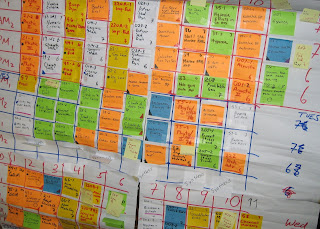William Nuttle, Organizer for CERF 2011 Synthesis Sessions
wnuttle@eco-hydrology.com
Q: How far can you wander into a jungle?
A: Half way.
This riddle came to mind during the June meeting of the Program Committee. For three days, in Daytona Beach, the committee labored to find our way through the thicket of topics submitted for presentation at the CERF 2011conference in November. On more than one occasion I found myself wandering off course, distracted reading an abstract that seemed ripe for immediate consumption. Such were the hazards of this work, but the committee valiantly soldiered on. By the end of day two we finally penetrated to the heart of the jungle and started on the journey back out.
 |
| Initial draft of CERF 2011 program - at the heart of the jungle |
We have made good progress since then. The conference program is now final. Presenters soon will learn their assigned time and location; possibly these emails have already gone out. And, we have set some markers - the topics for discussion during the synthesis sessions - intended to aid those who will follow us into this jungle during the CERF 2011 meeting in November.
Synthesis at CERF 2011
The synthesis sessions planned for CERF 2011 will examine how integrated ecosystem assessment (IEA) can be used to help societies, estuaries and coasts adapt to change. Integrated ecosystem assessment is a tool that scientists and managers can use to gather and synthesize the scientific information needed to support an ecosystem-based approach to management.
Topics identified for discussion will capture the latest findings, to be presented at the conference, and knit together ideas developed separately in concurrent sessions. The synthesis sessions will address six topics altogether. Three will be discussed during the session scheduled for Tuesday afternoon and three on Thursday afternoon, at the end of the conference. Each synthesis topic relates to topics covered by presentations during the regular sessions earlier on the conference schedule.
Tuesday Afternoon - Present State-of-the-art
The synthesis session on Tuesday afternoon, the second day of the conference, will discuss current approaches to IEA applied to estuarine and coastal ecosystems and lessons learned in the application of estuarine and coastal science to management.
Topic 1: IEA defined - What is integrated ecosystem assessment and how is it being used in coastal and estuarine ecosystems?
Topic 2: Human dimensions - How can we include humans and the effects of their activities on the coastal and estuarine environment in integrated ecosystem assessments.
Topic 3: Management applications – What have we learned from past experience of applying science in the management of coastal and estuarine ecosystems.
Thursday Afternoon - Emerging Challenges
The synthesis session on Thursday afternoon, at the end of the conference, will discuss some of the challenges emerging for both managers and scientists and whether and how IEA can be used to respond to them.
Topic 4: Baseline change – How can we account for the effects of uncontrollable change to drivers, e.g. climate change and rising sea level, in ecosystem assessments and in setting management goals?
Topic 5: Dynamic ecosystems - How can we detect, analyze and forecast change in coastal and estuarine ecosystems?
Topic 6: Management challenges - How do the problems that face managers in implementing ecosystem management of coasts and estuaries the regional scale affect the way that science is done?
A Chance to Step Back
Most importantly, the synthesis sessions are meant to give meeting attendees a break in their own wanderings through the CERF 2011 jungle. They are a chance to step back from the thicket of the regular sessions, take stock of what has been accomplished in coastal and estuarine science, and reconnoitre the challenges and opportunities that lie ahead.
Check back here for newer posts related to the synthesis sessions.
Check back here for newer posts related to the synthesis sessions.
No comments:
Post a Comment